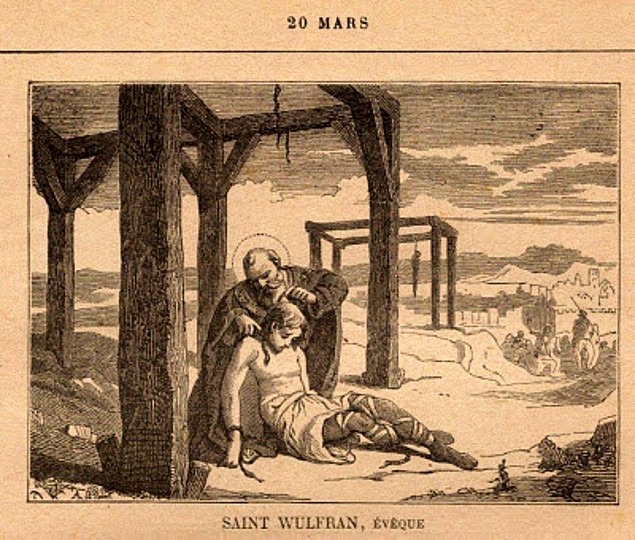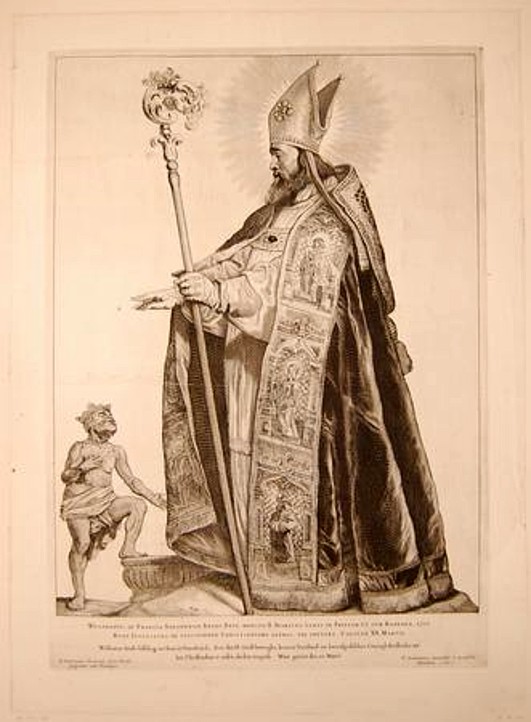Saint of the Day – 20 March – Saint Wulfram of Sens (c 640-c 703) Archbishop of Sens and Confessor, Missionary, miracle-worker. Born in c 640 in France and died on 20 March c 703 at Fontenelle, France of natural causes. Patronages – Abbeville, France, against the dangers of the sea/of sailors, childbirth and young children. Also known as Wulfram of Fontenelle, Offran, Oufran, Suffrain, Vuilfran, Vulfran, Vulfranno, Vulphran, Wilfranus, Wolfram, Wolframus, Wolfran, Wulframnus, Wulfran, Wulfrann, Wulfrannus. Additional Memorials – 15 October (translation of relics) and 8 November as one of the Saints of the Diocese of Evry.
Wulfran’s life was recorded eleven years after he died by the Monk Jonas of Fontenelle. However, there seems to be little consensus about the precise dates of most events, whether during his life or after hs death.
Wulfran’s father was an Officer in the armies of Dagobert, a powerful King of the Franks. The Saint spent some years in the Court of King Clotaire III and his mother, Saint Bathildes but he occupied his heart only with God, despising worldly greatness as empty and dangerous and daily advancing in virtue. He renounced the world and received Sacred Orders; his estate he bestowed on the Abbey of Fontenelle, or Saint Wandrille, in Normandy. He was nonetheless called to the Court, where he served until his father died. Then, because the Archbishop of Sens had recently died in 682, he was chosen to replace him, by the common consent of the clergy and people of that City.
He governed that Diocese for two and a half years, with great zeal and sanctity. It was a tender compassion for the blindness of the idolaters of Friesland and the example of the zealous English preachers in those parts, which moved him then to resign his Bishopric, with proper advice and after a retreat at Fontenelle, to enter Friesland as a poor missionary Priest.
On the voyage by water, the Deacon who served him at the Altar, accidentally dropped the paten into the sea. Saint Wulfran told him to place his hand where it had fallen on the waves and it came up to him by a miracle. For long years that paten was conserved in the Monastery of Saint Wandrille. On this mission wULFRAM baptized great multitudes, among them a son of their King, Radbod and drew the people away from the barbarous custom of sacrificing human beings to idols.
The custom was that pagan people, including children, were sacrificed to the local gods having been selected by a form of lottery. Wulfram, having remonstrated with Radbod on the subject, was told that the King was unable to change the custom but Wulfram was invited to save them if he could. The saint then waded into the sea, to save two children who had been tied to posts and left to drown as the tide rose. The turning point came, with the rescue of a young man, Ovon, who had been chosen by lot, to be sacrificed by hanging. Wulfram begged King Radbod to stop the killing but the people were outraged at the sacrilege proposed. In the end, they agreed that Wulfram’s God could have a chance to save Ovon’s life and if he did, Wulfram and his God could rescue him. Ovon was hanged and left for a few of hours, while Wulfram prayed. When the Frisians decided to leave Ovon for dead, the rope broke, Ovon fell and was still alive. Ovon became Wulfram’s devoted servant, his disciple, a Monk and then a Priest at Fontenelle Abbey. The faith of the missionaries (and their power to work miracles) frightened and awed the pagan people, who were Baptised and turned away from paganism.
Even Radbod seemed ready for conversion but just before his Baptism, he asked where his ancestors were. Wulfram told him that idolaters went to Hell. Rather than be apart from his ancestors, he chose to stay as he was.
Wulfran finally retired to Fontenelle, where he died in c 703. The Saint’s year of death is sometimes given as 720 but his interred body is said to have been moved in 704. Regardless of the exact year, St Wulfram’s feast day is kept on 20 March. He was buried in St Paul’s Chapel in the Abbey but in 704, his relics were translated to the Church. The body was again moved in 1058, this time to the collegiate Church of Our Lady in Abbeville, which was then re-dedicated in Wulfram’s name. The translation of his body to Abbeville is commemorated on 15 October.
At about this time or later, perhaps when his body was again moved, this time to Rouen, his arm was taken as a relic to Croyland Abbey, Lincolnshire. The interest in him there, may have arisen from Ingulph, the Zbbot being a former Monk of Fontenelle. After the building at Crowland was damaged by fire, there was no longer a suitable place for keeping the relic, so it went to Grantham for safe-keeping. For two or three hundred years, it was kept in the Crypt Chapel below the Lady Chapel, where the pilgrims helped to wear the hollow, now to be seen in stone step before the Altar. Later, towards 1350, the arm went to the specially added Chapel above the north porch. At some stage in the long process of the English Reformation, this relic was lost.
A hagiographical account of his miracles was produced at the Abbey of Saint Wandrille before 1066. Among the miracles are two pertaining to childbirth and children. In one, Wulfram is credited with the miraculous delivery of a stillborn baby, the mother having commenced labour on 20 January (the feast day of Saint Sebastian). A week after Easter, prayers to Wulfram caused her belly to split open so the dead child could be delivered, after which, the wound healed as if it had never been, leaving only a “token of the cut.”
In the other, Wulfram is credited with the safe passage of an accidentally swallowed clothespin, which left the body of a two-year-old boy, after three days, without having injured it: “Is it not miraculous how through all the twists of the boy’s intestines, as if through fine small round tubes, the copper sharp object, now going up high, now going down low, could travel without getting stuck anywhere or causing wounds and so at last through Nature’s lower parts, find a way out all in one piece?”








4 thoughts on “Saint of the Day – 20 March – Saint Wulfram of Sens (c 640-c 703)”